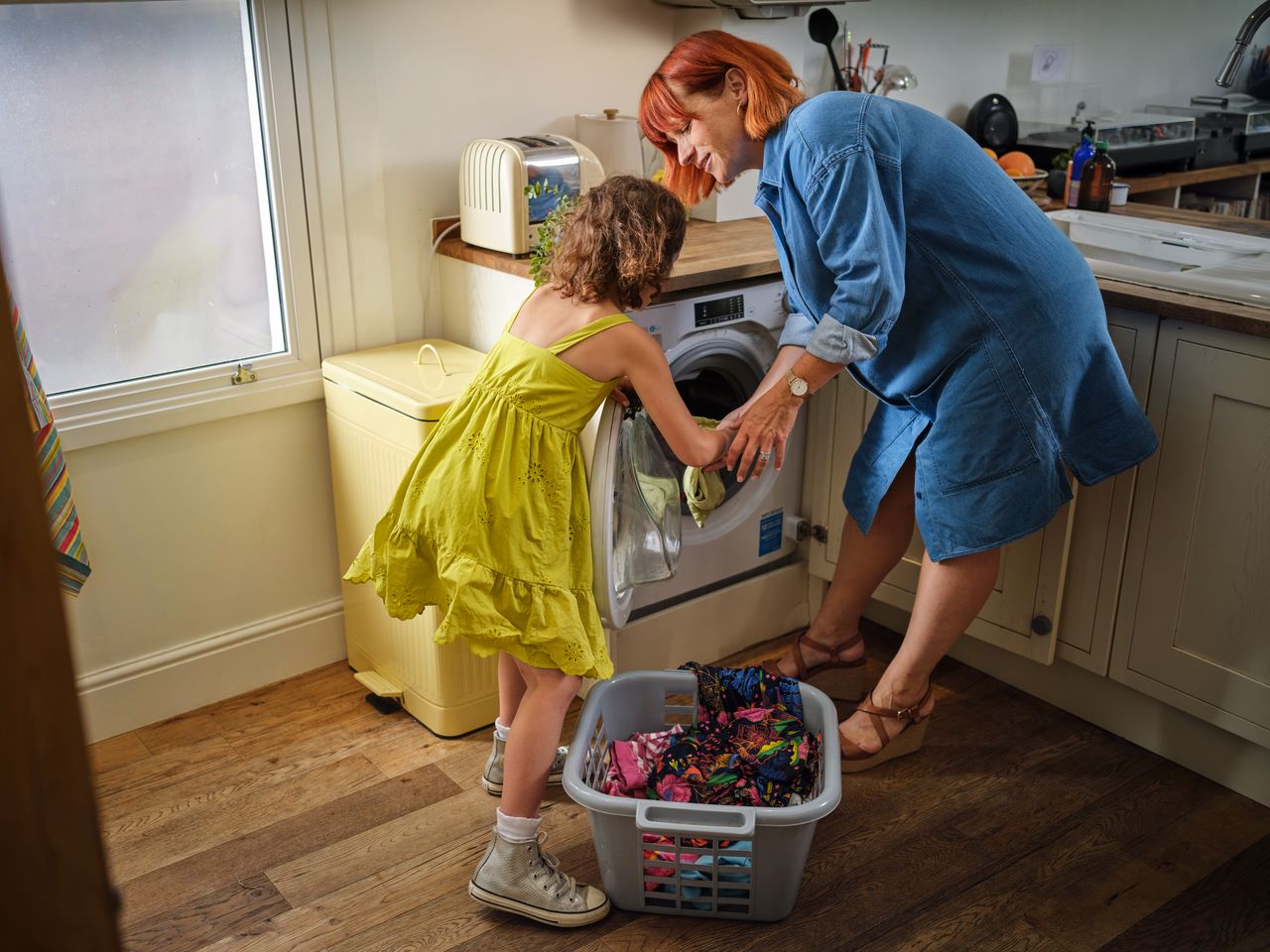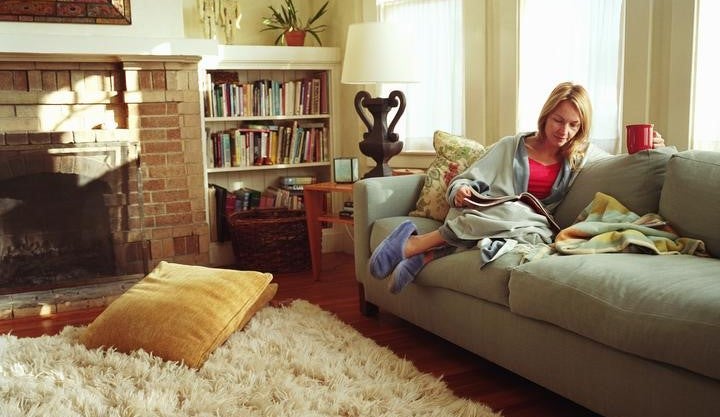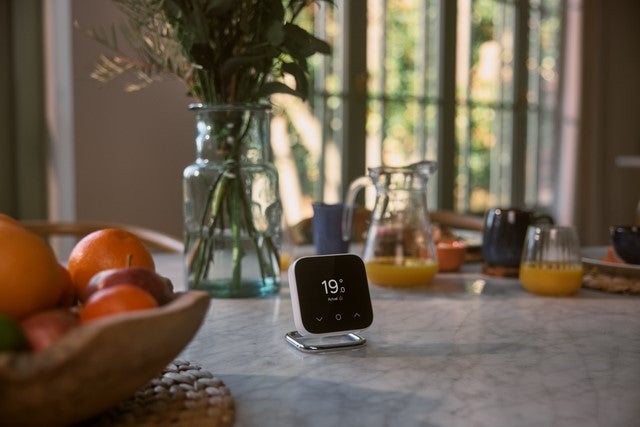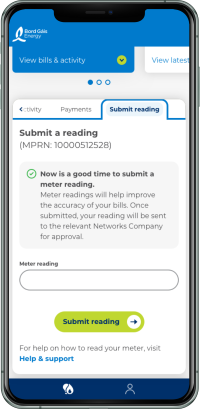Energy saving tips for your home
How to reduce your energy use and save money

Would you like to make your home more energy efficient and get more out of the gas and electricity you pay for? We’ve energy saving tips to help you lower your home’s carbon footprint and save money on your monthly bills.
Our best energy saving tips and advice
These six simple ways to reduce your energy usage could save you more than €900* on your bills.
SAVING: €316.86 a year
3 (kWh) x 2 (hours) x €0.3665 (unit price) = €2.20 (to fully heat tank)
x 6 (times a week) x 4 (weeks in a month) = €52.80 x 12 = €633.60 a year
VS
x 3 (times a week) x 4 (weeks in a month) = €26.40 x 12 = €316.80 a year
Saving: €633.60 - €316.80 = €316.86 a year
SAVING: €61.64 a year
9.5 (kWh) x €0.3665 (unit price) = €3.48 per hour / 60 x 7 = €0.41 (7 min shower)
VS
€3.48 / 60 x 10 = €0.58 (10 min shower)
Saving: €0.17 x 30 = €5.10 a month x 12 = €61.64 a year
Prices based on electric shower energy usage rates.
SAVING: €77.76 a year
3kWh x €0.3665 (unit price) = €1.10 an hour / 60 x 45 = €0.83 per 45-minute load approx.
Estimated average 4 loads per week:
€0.83 x 4 = €3.32 a week x 4 = €13.28 a month
Reduced to 2 loads per week:
€0.83 x 2 = €1.66 a week x 4 = €6.64 a month
Saving: €6.64 a month x 12 = €79.68 a year
SAVING: €206.45 a year
Traditional bulbs: 75W per hour x 10 (lightbulbs) x 2.5 (hours per day) = 1875W = 1.875kWh x €0.3665 (unit price) = €0.69 per day x 365 = €252.19 per year
LED bulbs: 9W per hour x 10 (lightbulbs) x 2.5 (hours per day) = 225W = 0.225kWh x €0.3665 = €0.08 per day x 365 = €29.19 per year
10 LED lightbulbs = €20 (average estimated cost)
Saving: €252.19 – €29.19 = €223 – €20 (cost of bulbs) = €203 a year
SAVING: €186.50 a year
Average annual gas bill: €1865
Saving: €1865 / 10 = €186.50 a year
SAVING: €55.48 a year
2.5kWh x €0.3665 = €0.92 per hour / 60 = €0.02 per minute (boil 1 cup) x 5 (times a day) = €0.10 per day x 365 = €36.50 a year
VS
€0.02 x 3 minutes (boil full kettle) x 5 (times a day) = €0.30 per day x 365 = €91.98 a year
Saving: €91.98 – €36.50 = €55.48 a year
Total Savings: €905.69 a year*
Based on Bord Gáis Energy’s standard electricity Urban 24 Hour tariff rate of 36.65 c/kWh and standard gas tariff of 11.17 c/kWh (inc. VAT as of 22 January 2025). Final electricity and gas bills include an annual standing charge, PSO payment (electricity only), and carbon tax (gas only).
Please note: all figures stated are based on the average energy consumption of relatively new, mid-range appliances with average energy efficiency. Please check the wattage of your own appliance for greater accuracy. A new rating scale for appliances was launched in 2021.
Kitchen: cooking and food storage tips

Cooking
Cooking is one of the most energy-intensive activities in the home, here are some simple ways you can save energy in the kitchen.
- Flat-bottomed pots and pans allow heat to disperse more evenly
- Cookware with copper on the bottom heat up faster than other materials
- Putting lids on your pots and pans speeds up cooking time
- Match the size of your pan to the hob you’re using to avoid wasting energy
- Glass or ceramic dishes are most efficient when cooking in the oven, so you can cook at a lower temperature or for a shorter time
- Batch cook different meals in the oven at the same time
- Reheating food (particularly using a microwave) is much more energy efficient than starting from scratch
- Slow cookers and air fryers are more energy-efficient alternatives to the oven if you haven’t had time to batch cook
- But don’t boil extra! A very common tip but a good habit to get into – only boiling the amount of water you need can save a lot of energy over time
- Avoid opening your oven door too often during cooking – you can lose up to 20% of the oven’s heat doing this so it has to work harder to maintain its temperature
- Make use of the heat that has built up during cooking by turning off the oven for the last few minutes of cooking time
Fridge and freezer
There’s no way around your fridge and freezer using electricity all day, every day. So to help you avoid any wasted energy use, we’ve put together some tips on keeping them running efficiently.
Aim to keep 20% of the space free – overloading your fridge forces it to use more energy to stay cold.
- It takes about 45 minutes for your fridge to get back to its original temperature if the door is open for just 10-20 seconds.
- Knowing what you’re going to take out of the fridge before you open it and making sure the door is closed fully afterwards will help minimise electricity use
Putting hot food in your fridge will make it have to work extra hard to cool down the food and keep the fridge at the correct temperature.
Having appliances that expel heat (like an oven or dishwasher) beside your fridge and freezer will make them use more energy to stay cold.
Defrost your freezer every 6 months (or when the frost is ¼ of an inch thick).
Utility room: laundry and cleaning tips

- Wash clothes at 30°C if possible.
- Use 'Eco' settings – even if they take longer, they’re more energy efficient.
- Wait until you have a full load to wash rather than doing two half loads.
- If you’ve a smart meter and are on a Time of Use plan, using your washing machine or tumble dryer at the time when your electricity tariff rates are lower will save you money.
- This is an obvious one, but avoiding using a tumble dryer will save a lot of energy.
- When you do use a tumble dryer, make sure to put heavy and light clothes into separate loads.
- Heated clothes airers can be a good compromise for winter days – they’re quite cheap to run (about 14c per hour) and you’ll get the benefit of the residual heat in the room that they’re in.
Living spaces: washing, grooming and recreation tips

As you can see, most of the devices we use for recreation don’t use as much energy as those for cooking and cleaning! However, there are some simple changes you can make to help reduce your energy consumption in these areas too.
Devices like TVs, games consoles, and desktop computers can use significant energy on standby. For example, a modern TV left on standby uses around 10W/hour, which adds up to 87.6kWh per year. At €0.37 per kWh, this costs about €32 annually for just one TV. If you also switch off a games console (approximately 12W/hour on standby) and a desktop computer with peripherals (15W/hour), you could save over €75 a year by turning off these three devices when not in use.
If you can reduce your time in the shower by 3 minutes a day, you could save about €62 a year.
They now cost about 5c an hour to run (depending on which setting you use), so used sparingly they can be an efficient solution for staying warm during cold winter nights.
Work from home tips
Working from home can increase your energy bills, but there are a few simple things you can do to reduce unnecessary energy use.
- Fully shut down or unplug devices when they’re charged or not in use
- Switch to LED bulbs - traditional bulbs use about 6 times as much electricity as LED bulbs
- Set up your home office or workspace so that you’re not blocking radiators and preventing the flow of heat into the room
- When it’s not too cold outside, consider turning off radiators in rooms you don’t use regularly. Or try using a portable heater instead of central heating if you spend most of the day in one room
Home heating tips
Making sure your home is warm enough when it's cold outside isn’t something to compromise on. So, we’ve put together some ways you can make sure your heating is running efficiently and you’re not wasting energy to keep your home cosy.
- Bleed your radiators regularly.
- Service your boiler every year.
- You may already be doing this, but reducing your central heating by 1°C can lower your overall heating bills by 10%.
- Use timers or smart heating controls so your heating only comes on when it’s needed
Use the radiator valve to turn the temperature down or to turn off the radiator completely in rooms you’re not in a lot. - Set your gas boiler at 65-70°C and your hot water temperature to 60-65°C to help avoid overheating
Insulating your hot water cylinder will make it more energy efficient.
Not sure how much energy your appliances use?
Don’t worry! We’ve made a list of some common household appliances, how much energy they use** and what they cost* to run, to help you get started.
KitchenKitchen | |||
KitchenKettle | 2500W/hour or 2.5kWh | x €0.3665 | = €0.92 for 1 hour |
KitchenOven | 2500W/hour or 2.5kWh | x €0.3665 | = €0.92 for 1 hour |
KitchenMicrowave | 800W/hour or 0.8kWh | x €0.3665 | = €0.29 for 1 hour |
KitchenSlow cooker | 200W/hour or 0.2kWh | x €0.3665 | = €0.07 for 1 hour |
KitchenToaster | 1500W/hour or 1.5kWh | x €0.3665 | = €0.55 for 1 hour |
KitchenFridge/freezer | 350kWh per year | x €0.3665 | = €35.65 per year / €0.10 per day |
KitchenDishwasher | 1.5kWh per cycle | x €0.3665 | = €0.55 for a standard 65°C cycle |
Utility roomUtility room | |||
Utility roomWashing machine | 1kWh per cycle | x €0.3665 | = €0.37 for a standard 40o wash |
Utility roomTumble dryer | 3000W/hour or 3kWh | x €0.3665 | = €1.10 for 1 hour |
Utility roomHeated airer | 300W/hour or 0.3kWh | x €0.3665 | = €0.11 for 1 hour |
Utility roomIron | 2500W/hour or 2.5kWh | x €0.3665 | = €0.92 for 1 hour |
Utility roomVacuum cleaner | 700W/hour or 0.7kWh | x €0.3665 | = €0.26 for 1 hour |
Living roomLiving room | |||
Living roomTV (55” LED) | 100W/hour or 0.1kWh | x €0.3665 | = €0.04 for 1 hour |
Living roomBluetooth speaker | 25W/hour or 0.025kWh | x €0.3665 | = €0.01 for 1 hour |
Living roomGames console | 200W/hour or 0.2kWh | x €0.3665 | = €0.07 for 1 hour |
BedroomBedroom | |||
BedroomLamp (LED bulb) | 10W/hour or 0.01kWh | x €0.3665 | = €0.004 for 1 hour |
BedroomLamp (traditional bulb) | 60W/hour or 0.06kWh | x €0.3665 | = €0.02 for 1 hour |
BedroomElectric blanket | 150W/hour or 0.15kWh | x €0.3665 | = €0.05 for 1 hour |
BedroomHairdryer | 2000W/hour or 2kWh | x €0.3665 | = €0.73 for 1 hour |
BedroomHair straightener | 120W/hour or 0.12kWh | x €0.3665 | = €0.04 for 1 hour |
BathroomBathroom | |||
BathroomImmersion/Bath | 3000W/hour or 3kWh | x €0.3665 | = €1.10 for 1 hour |
BathroomElectric shower | 9500W/hour or 9.5kWh | x €0.3665 | = €3.48 for 1 hour |
Home officeHome office | |||
Home officeDesktop computer | 200W/hour or 0.2kWh | x €0.3665 | = €0.07 for 1 hour |
Home officeLaptop | 70W/hour or 0.07kWh | x €0.3665 | = €0.03 for 1 hour |
Home officeWiFi router | 10W/hour or 0.01kWh | x €0.3665 | = €0.004 for 1 hour |
Home officePhone charger | 5W/hour or 0.005kWh | x €0.3665 | = €0.002 for 1 hour |
Home officePortable heater | 1200W/hour or 1.2kWh | x €0.3665 | = €0.44 for 1 hour |
For more insights on home appliances, check out our detailed breakdown of appliance electricity costs.
* Based on Bord Gais Energy’s’ standard electricity Urban 24-Hour tariff rate of 36.65 c/kWh (inc. VAT as of 22 January 2025). Final electricity bills also include an annual standing charge and PSO payment.
** Please note: all figures stated are based on the average energy consumption of relatively new, mid-range appliances with average energy efficiency. Please check the wattage of your own appliance for greater accuracy. A new rating scale for appliances was launched in 2021.
Smart home tips

A smart thermostat lets you control your heating with your smartphone or tablet. Here at Bord Gáis Energy, we’ve partnered with Hive as our official Smart Home service provider. Hive will work with your existing boiler and lets you control your heating and hot water tank from your app or smart thermostat.
This means that if you forget to switch your heating off before you go out, or you’re going to be home later than planned, just tap the app to turn it off using your smart device. And you can set your own schedule so the heating’s only on when you want it to be.
Click here to learn more about Hive.
LED lightbulbs are 85% more energy-efficient than traditional lightbulbs so can add up to big energy savings over time.
Smart electricity meters are being rolled out by ESB Networks in homes and businesses across Ireland. Once your smart meter has been installed, you can move to a Bord Gáis Energy smart plan.
Signing up to a smart plan gives you the flexibility to use your electricity at times when it costs you less. And you can monitor your daily usage and set your spend goals so you’ll be alerted when you’re about to go over your target.
Visit our smart plans page or our plan finder tool for more information.
For a detailed guide on adopting smart home technology, see our Ultimate Guide to Smart Homes in Ireland.
Benefits of a smart plan
- Understand your energy usage better
- Use electricity off peak to get a cheaper rate
- Monitor usage to lower your carbon footprint
- No more estimated bills
- Flexible billing options
Home improvement tips
Energy-efficient homes reduce unnecessary energy consumption, increase the use of renewable energy, and ultimately resulting in lower energy bills.
The following tips can be expensive so may not be for everyone, but making your home more energy efficient will mean longer term savings and a more comfortable home.
Energy-efficient homes should be well-insulated and sealed against draughts. About 25% of the heat loss in your home happens through your attic, so adding or updating attic insulation can reduce your annual energy bills dramatically. Wall insulation is another good idea to prevent heat escaping your house, particularly if your house was built before the 1990s.
Adding Solar PV Panels to your house can supply power to appliances in your home, as well as heating water. After this, any remaining excess power feeds the grid (which can earn you money). Check out our Beginner’s Guide to Solar Energy for more information or book a free solar consultation with our expert team.
A heat pump is a device that measures and controls your home’s climate by distributing the heat that is already available in the air. Heat pumps are one of the most efficient ways to heat a house and can cut home heating emissions by 60%. Take a look at our Heat Pump Guide for more information or register your interest for a free consultation.
For more information on energy efficient solutions, see our Energy Efficiency Guide.
While some of the above tips require significant investment, don’t forget the government offer SEAI grants to assist homeowners with energy efficient upgrades. For more information on this, read our guide on securing an energy upgrade grant or visit the SEAI website.
Upgrade your home
We have a range of services designed to suit the needs of our customers. We want to help you to upgrade your home and suit your lifestyle
ServicesMeter Reading
Submitting regular meter reads improves the accuracy of your bills and ensures you only pay for what you use. The quickest way to submit a reading is by signing in to your online account. If you don't have an account, register now. Click here for more information on how to submit a reading.

Please note: if you have a smart electricity meter and are signed up to one of our smart plans, you don’t need to provide meter reads – they’ll be automatically submitted to ESB Networks.
Meter Reading
If you're unsure how to read your meter, please follow our step-by-step guide or learn more on how to submit a reading.
Learn moreHome appliance costs
With this quick guide, we break down home much electricity your appliances use up.
Sustainability hub
Sustainable energy is no fad - it's very much the future. So embrace it with our expert advice and services.